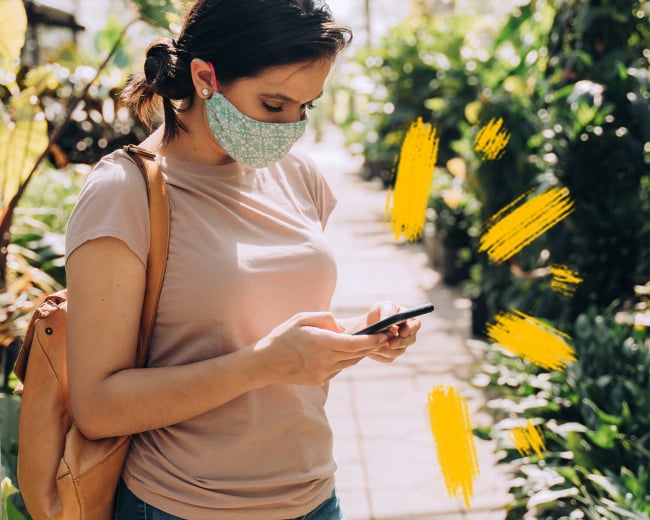Language learning in a pandemic
The COVID-19 pandemic has put strain on all our lives. People have made sacrifices and it’s been incredibly tough for everyone in different ways. We’re coming up to 1 year since the first lockdown in the UK, and on the surface it might seem like there’s not been much hope.
But there seems to be a light at the end of the tunnel. The vaccine is being rolled out and slowly but surely, restrictions are being lifted. People have learned new skills, reached out to family members, and started new hobbies. From the comfort of their sofas, people have discovered new cultures, explored new worlds and listened to real native speakers.
Language learning as a hobby has increased significantly during the first lockdown. In November 2020, the British Council surveyed 2000 adults, and 10% of them had started learning a language over lockdown. Mark, Reb and Alex, are three of those learners.
While there are plenty of reasons to learn a language at any time (such as for mental and physical health benefits, cultural exploration and embracing new ideas) the pandemic has provided a unique environment in which to learn. Most people have had more time on their hands to discover new things about themselves and the world around them.
Reasons to learn a new language
Mark, 50, can vouch for this. “I had an Ancestry DNA test and it came up with the family having a Norwegian connection. I read into Norwegian and many different websites said Scandinavian languages are more straightforward to learn. The more I looked into Norwegian, the more it seemed to be the right choice.”
Some people have even upped and moved across the world, and need to learn a new language to help themselves get by. Alex, 33, is one of them. Originally from Seattle, Washington, Alex moved from the USA to Sweden as his partner got a job there. “Learning Swedish will help me fit into this country and culture better, and I’m excited for that. I speak French already so it will be nice to be in and near countries where I can navigate with languages other than English.”
Of course, the reasons to learn a new language are endless. Whatever you choose, learning a language allows you to connect with people from all over the world, experience different cultures and help with brain training all at the same time. We’re living in an increasingly globalised world, so learning another language can help you to boost your career and the likelihood of finding a new job, makes travelling much easier and it opens you up to a world of new entertainment, like music, art, books and films.
In fact, the reasons above are exactly why Reb, 28, decided to learn Japanese. “I've really enjoyed Japanese media since I was a child… and I have always enjoyed Japanese video games. I also have some friends who live in Japan and I would love to be able to communicate with them in Japanese… Plus, I really want to be able to read, listen and speak Japanese so I am able to make more friends.”
COVID’s impact on language learning
COVID-19 has had a vast impact on almost all aspects of our lives, and language learning is part of that. There have been good and bad effects on language learning. For example, for Mark and Reb, it’s given them more time to practice. Reb says she has more time for studying than in the past. “I pick up the app in the morning with breakfast, during my work breaks… and sometimes when I’m relaxing in the evening. Since I've not been able to go out, I've found myself taking more time and effort on my hobbies, to keep my mental health in a good place.”
Mark started to see his learning really take off during the first lockdown.
“I was furloughed and had the time to complete the exercises - I did it before homeschooling my son and did one uninterrupted 44 day streak! I think I still benefit from the effort I put in then, even now.”
However, Alex has struggled with the fact that he’s unable to meet native Swedes to practice with. “It’s harder to keep myself motivated [as] I don’t have the opportunity to make Swedish friends and practice language with them.”
Travel: a dream for the (hopefully-not-too-distant) future
One thing that has united Alex, Reb and Mark is their desire to travel once it’s safe and allowed. “100%, Japan is going to be the first place I will visit once we live in a post-COVID world.” Reb says. “I’m excited to see my friends again, eat lots of nice food, visit many heritage sites and most importantly, use the language I've been studying!” Mark is planning a kayaking trip in the fjords as soon as COVID restrictions end, and although Alex is already in Sweden he’d love to visit more of it. “I moved to Europe to travel and instead I’ve spent the entire year I’ve been here in my apartment.” We feel you, Alex 👀.
Find out more information here on our users’ COVID learning habits.
Thanks to Reb, Mark and Alex for their contributions. Bonus: Alex has sentover his favourite Swedish pun:
“Postnord is the national post office. Ost means cheese. Ostnord is so simple but it made me laugh so hard”








